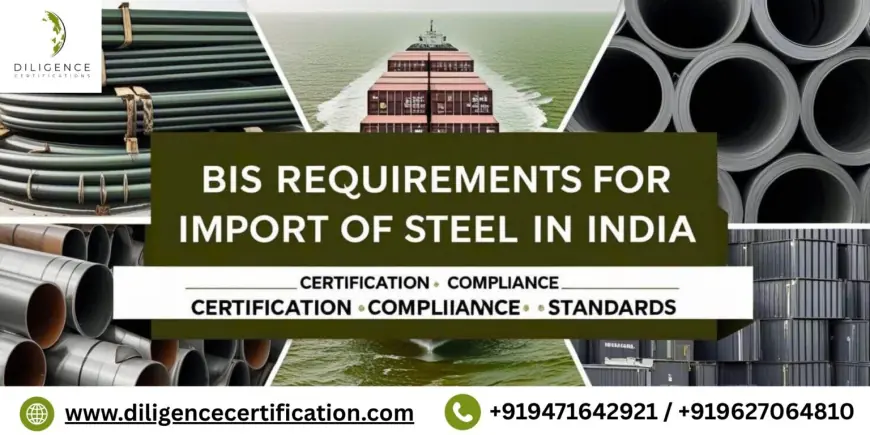BIS Requirement For Import Of Steel
Summary BIS requirement for import of steel ensures only quality-tested steel enters India. Importers must obtain BIS certification, No Objection Certificate (NOC), and ISI Mark for compliance. This guide explains process, cost, and step-by-step certification for steel importers. Introduction Last year, one of our clients—a mid-sized infrastructure company importing specialised structural steel from Japan—faced a huge delay at Mumbai port. Despite the superior quality of the steel, the customs officials refused clearance because the consignment lacked the necessary ISI Mark and BIS certification. The company was forced to expedite the Bureau of Indian Standards' (BIS) No Objection Certificate (NOC) application process. Due to the two-week delay, the project's cost overrun came close to ₹50 lakhs. This is not an isolated story. Every week, Indian ports hold back shipments of steel because importers overlook one crucial detail: the BIS requirement for import of steel. If you’re an importer or a distributor, understanding the exact certification process is not just compliance—it’s business survival. Why BIS Requirement for Import of Steel Matters The Bureau of Indian Standards (BIS) is responsible for maintaining quality assurance. Steel is used extensively in India's infrastructure to construct automobiles, bridges, metro rail systems, and even medical devices. Imports of poor quality may endanger public safety. All steel products covered by the Compulsory Registration Scheme (CRS) of the Bureau of Indian Standards must bear the ISI Mark prior to being sold in India. Importers must obtain a BIS certification, and a BIS No Objection Certificate (NOC) is frequently needed for customs clearance. A Complete Guide to Steel Import BIS Certification Procedures 1. Determine Relevant Steel Standards Different steel categories fall under different IS codes. For example: IS 2062: Hot rolled medium and high tensile structural steel IS 1786: High strength deformed steel bars for concrete reinforcement 2. Apply for BIS Certification The application is submitted through the Manak Online Portal of BIS. Required documents include: Manufacturer’s test report Manufacturing licence Product specifications Quality control certificates 3. Factory Audit & Sample Testing BIS officials may visit the foreign manufacturer’s plant to verify quality processes. Samples are drawn and tested at a BIS-recognised lab in India. 4. Grant of BIS Licence & ISI Marking Once approved, the product receives the ISI Mark, which must be printed on all packages. 5. No Objection Certificate (NOC) for Imports In certain cases, BIS issues a No Objection Certificate to allow import of consignments under transition or pending approval. ISI Marking for Steel Products The ISI Mark is a symbol of reliability rather than just a logo. Indian standards for tensile strength, elongation, and chemical composition are assured to be met by steel products bearing the ISI Mark. Without ISI Marking: Customs will not clear consignments. Buyers in India (PSUs, EPC contractors) will reject the product. Importer risks penalties under the BIS Act, 2016. Common Challenges Faced by Importers Delays in lab testing due to high backlog. Foreign manufacturers resisting audits, especially small mills. Mismatch between IS codes and foreign grades. For example, Japanese JIS standards don’t always map directly to Indian IS codes. High cost of compliance for low-volume importers. At least three months prior to the shipment date, begin the process. Consult a BIS-recognized expert to lessen the likelihood of paperwork rejection. To reduce the possibility of paperwork rejection, seek advice from a BIS-recognized specialist. If importing temporarily, explore NOC issuance rather than full certification. Always print the ISI Mark clearly on packaging—BIS can seize goods if marking is unclear. Conclusion The BIS requirement for import of steel is not just a bureaucratic formality—it is the backbone of quality assurance in India’s growing economy. Whether it’s ISI Marking for steel products, obtaining a No Objection Certificate (NOC), or budgeting for the cost of BIS steel import certification, compliance is non-negotiable. If you’re planning to import steel into India, don’t wait until your shipment is stuck at port. Start your BIS certification early and work with experts who know the ground reality. At Diligence Certifications, we help clients navigate the process with zero delays. Why Choose Diligence Certifications? When it comes to BIS compliance, experience matters. At Diligence Certifications, we transcend mere paperwork filing; we serve as your comprehensive partner throughout the entire process. Our team has collaborated with international steel brands, overseen intricate factory audits overseas, and swiftly addressed customs disputes. Customers trust us because we combine our technical knowledge of Indian Standards (IS codes) with real-world business insights. By choosing our services, you can enter the Indian market more quickly, with fewer delays and compliance risks. FAQ Section Q1. What is the BIS requirement for import of steel in India? All notified steel products are required by the Bureau of Indian Standards to be certified in compliance with the relevant Indian Standards and to bear the ISI Mark. Prior to customs clearance, importers must obtain BIS certification and, in certain cases, obtain a No Objection Certificate (NOC). Q2. How long does BIS steel import certification take? The timeline varies between 8–12 weeks, depending on factory audits and lab testing. Some importers may get provisional approval through a NOC while certification is in progress. Q3. What is the cost for BIS steel import certification? On average, importers should budget between ₹xx lakhs and ₹xx lakhs. This includes application, testing, inspection, licence, and marking fees. Costs vary depending on product type and quantity. Q4. Can I import steel without ISI Mark? No. For products under mandatory certification, importing without ISI Mark is illegal. Customs will seize the shipment and BIS may impose penalties. Q5.For imports of steel, who grants the No Objection Certificate (NOC)? In certain situations, such as pending certification or import for research and development, the Bureau of Indian Standards issues NOCs. Importers must apply through BIS with supporting

What's Your Reaction?
 Like
0
Like
0
 Dislike
0
Dislike
0
 Love
0
Love
0
 Funny
0
Funny
0
 Angry
0
Angry
0
 Sad
0
Sad
0
 Wow
0
Wow
0

















































